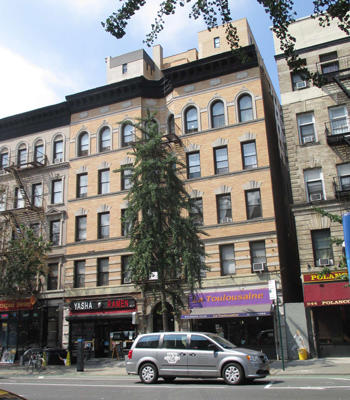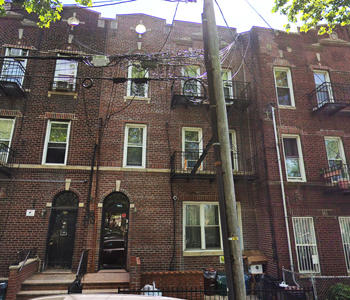For nearly two years, tenants at 940 Amsterdam Avenue didn’t have cooking gas.
Blaine Morris, a Columbia student, lived at the building from August 2016 to August 2017. During that time, she had cooking gas for only three months.

940 Amsterdam Avenue
“The gas went out in November 2016, and I moved out August 1, 2017. We didn’t have gas that entire time. I ran into my neighbor the following year, in November, and she said it was still out,” Morris said. “I just ended up eating a lot of bacon, egg and cheese sandwiches and roti roll.”
When her landlord, Rhea Vogel, gave Morris and her roommates an electric stove as a placeholder, it broke within a month, Morris said. She finally gave up trying to cook.
“Rhea Vogel was the worst,” she said.
Vogel is one of two landlords initially featured in ads for an anti-rent regulation reform campaign funded by the Real Estate Board of New York. The ads focus on two New York City property owners emblematic of mom-and-pop landlords who, according to the campaign, won’t be able to afford basic maintenance needed to keep their tenants happy if various changes to state rent regulation laws are approved.
What the ads don’t mention is that the two landlords have each deregulated roughly half of the stabilized units in their buildings in the past nine years. And records show that tenants at the Amsterdam Avenue property owned by Vogel recently went without cooking gas for 20 months. During that shutdown, Vogel’s building next door — 938 Amsterdam Avenue — also went without gas for at least eight months. Though outages are a common problem in the city’s building stock, those experienced at the Amsterdam properties — whose owner is held up as a prime example of why certain rent regulation incentive programs are essential in the city — raises questions about how rent stabilized landlords maintain their buildings.
In response to The Real Deal‘s inquiry, a spokesperson for the campaign said Vogel is a “responsible landlord who volunteered to share with state lawmakers the economic realities of owning a building in New York City.”
The spokesperson also said that New York City has a “real affordable housing crisis, and we aren’t going to solve it by denigrating lawful landlords who are doing the best they can for their tenants.”
Prolonged outages
In February 2017, the owners of Yasha Ramen at 940 Amsterdam filed a lawsuit against an entity controlled by Vogel. The lawsuit alleged that a local utility company determined in 2016 that the building’s pipes were so “old, unsafe, out of repair, dangerous, and unfit for further use” that cooking gas couldn’t be used on the property until the landlord replaced or renovated the pipes. The issue ultimately forced the restaurant to close, according to the complaint.
“Our entire investment went up in gas,” said Hannah Gibbons, the manager of Yasha Ramen. “It happened very quickly. [The Con Edison technician] came in and said: ‘Are you about done with your lunch service? Because I need to turn the gas off.’ I thought he was just going to turn it off for a few minutes. In one moment our business went down the tube.”
Gibbons said although she did not place all of the blame for the gas outage in the nearly 100-year old building on Vogel, the prolonged shut-off was catastrophic for the restaurant. Gibbons also said that performing maintenance and making repairs was Vogel’s responsibility.
The lawsuit filed by Yasha Ramen’s owners remains active.
Around the same time, renters at 940 Amsterdam, a low-rise walkup that’s steps away from Columbia University, began calling 311 to complain about a lack of cooking gas, though they had heat and hot water. They would collectively file nine complaints in as many months during 2017, according to city records.
A Con Edison representative told TRD that the gas was shut off on November 9, 2016, initially due to a gas leak and then because of an “internal issue” at the building and wasn’t restored until July 18, 2018, when Vogel was able to prove that repairs had been made. A spokesperson from the Department of Buildings noted that there was a building-wide cooking gas outage because Vogel needed to replace the gas risers. The effort to restore cooking gas stalled when the pipes failed a DOB inspection in February 2018, according to the agency.
Vogel did not respond to questions about the gas line repairs, but a spokesperson for the campaign said Vogel “did exactly what anyone should do in this situation.” She’d called 911 when she smelled gas in the building, and, according to the spokesperson, it was a Con Edison employee who damaged the property’s pipes and instigated the extensive repairs. (Con Edison did not have any record of this occurring, according to a representative.)
The groups’ spokesperson wouldn’t comment on the state of the aging pipes when Con Ed responded to the building nor if the fact that the utility personnel easily broke the building’s equipment implied that the system was in serious need of an upgrade anyway. A representative for Con Edison indicated that repairs can take several weeks or months.
Himmelstein noted that after the fatal gas explosion in East Harlem in 2014 and another in the East Village in 2015, Con Edison and the DOB have been stricter about when landlords can turn their gas back on after a reported leak. He said if landlords hustle, they can make the necessary repairs in two to three months.
A campaign is launched
The campaign, targeted at politicians in Albany, is supported by a coalition of landlord groups — REBNY, Small Property Owners of New York, Community Housing Improvement Program (CHIP) and the Rent Stabilization Association (RSA). The ad campaign, dubbed “Responsible Rent Reform,” is funded by a 501c4 called “Taxpayers for an Affordable New York,” whose president is REBNY president John Banks.
The campaign is fighting against the proposed elimination of vacancy decontrol and bonuses, as well as programs that allow landlords to increase rent by completing upgrades on their buildings, including Major Capital Improvements and Individual Apartment Improvements.
The cooking gas outage encapsulates one of the central questions surrounding the debate over these programs: Should rent-regulated landlords be entitled to rent boosts to properly maintain their buildings? Tenant advocates argue that these programs incentivize displacement of rent regulated tenants, while landlords say that their absence will mean a halt in needed building repairs.
On paper, two of the programs on the chopping block allow landlords to permanently increase rents on stabilized apartments by improving their buildings. While the programs are designed to incentivize landlords to maintain their properties, for many landlords in the city, their real end game is to turn these units over to market rate.
A central argument for killing MCIs, IAIs and other programs is that they encourage the displacement of rent stabilized tenants. Since 1994, more than 155,000 rent-regulated units have been deregulated, mostly through high-rent vacancy deregulation, according to a 2018 report by the city’s Rent Guidelines Board. In a report released by REBNY, the organization notes that 2017 saw a net gain of 4,387 rent stabilized units (mostly through 421a, according to the RGB).
In one of the campaign’s videos, Vogel says she “takes pride in maintaining her buildings” but gets “crushed by all these taxes and fees.” Property records show that Vogel doesn’t have debt on 940 Amsterdam, though she did receive a $350,000 loan in 2005 for the neighboring property at 938 Amsterdam. In an interview last month, she said she last received approval for MCIs a decade ago for electrical and window work at her buildings.
A spokesperson for the landlord groups added that at the time of the outage at 940 Amsterdam, “there were no rent increases and only one tenant moved out.”
According to tax bills, from 2016 to 2017, two stabilized units at 940 Amsterdam were deregulated. And eight of the 21 stabilized apartments in Vogel’s two 13- and 17-unit buildings on Amsterdam Avenue were destabilized from 2009 to 2017, tax bills show. Vogel declined to comment. A representative for the landlord groups noted that she deregulated these units legally. Records also show that no units were deregulated during the gas outage at 938 Amsterdam.

610 67th Street in Brooklyn (Credit: Google Maps)
Down at the tip of Brooklyn in the Bay Ridge neighborhood, Reshit Gjonvic, the second landlord initially featured in the REBNY campaign, has become a vocal advocate for continuing programs like MCIs and IAIs.
Gjonvic owns 610 67th Street in Bay Ridge, Brooklyn with his wife, Aisia Gjonvic. The building has lost three out of six of its rent stabilized units since 2009, tax data shows. Since buying the building in 1997, Gjonvic hasn’t filed any permits with the DOB for either major or minor renovations. There is no record of a violation on the building since the early 1990s, according to DOB data. Gjonvic did not return a request for comment.
On Wednesday, the campaign released two more videos featuring different landlords.
